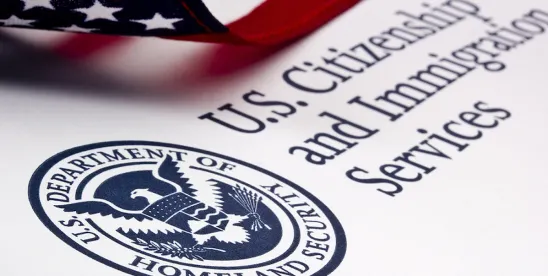Highlights
- On Jan. 20, President Trump issued several executive orders that have a wide-ranging impact on U.S. immigration and border security
- These executive orders, which attempt to reshape the definition of American citizenship, have resulted in immediate litigation
- They also could result in new travel restrictions and additional delays for travelers seeking visas at U.S. Consulates abroad
- Nationals of certain countries admitted to the U.S. since Jan. 20, 2021, could be at risk of removal proceedings
Shortly after his inauguration on Jan. 20, President Donald Trump issued several significant executive orders (EOs). While these EOs covered several areas of American society, a very significant number focus on immigration and border security. This alert summarizes several of these EOs with a particular focus on their prospective effect on employers and the foreign nationals they employ.
Executive Order on Birthright Citizenship Titled Protecting the Meaning and Value of American Citizenship
On Jan. 20, the EO on Protecting the Meaning and Value of American Citizenship was issued. This EO seeks to limit birthright citizenship to children of U.S. citizens or lawful permanent residents and sets forth the policy of limiting the scope of individuals to be recognized as American citizens.
As background, the 14th Amendment’s citizenship clause grants citizenship to almost all children born in the U.S. (children of foreign diplomats are not conferred U.S. citizenship). It states, “All persons born or naturalized in the United States, and subject to the jurisdiction thereof, are citizens of the United States and of the State wherein they reside.” In essence, if you’re born here, you’re an American. The principle of birthright citizenship is long-standing and has been confirmed in multiple U.S. Supreme Court rulings.
This EO is not retroactive but would apply to all children born in the U.S. on or after Feb. 19, 2025, who do not have at least one U.S. citizen or lawful permanent resident parent.
Multiple states and civil rights organizations have jointly filed a lawsuit challenging the constitutionality of the EO. As of Jan. 23, a federal court in Washington has granted a 14-day injunction on enforcement of the order, calling it “blatantly unconstitutional.” During this 14-day period, the court will determine whether to issue a permanent injunction. It is likely this matter will be litigated all the way to the Supreme Court.
Importantly, an EO titled Protecting the United States From Foreign Terrorists and Other National Security and Public Safety Threats directs relevant federal agencies to identify countries that may warrant restrictions affecting the ability of foreign nationals to travel to the U.S. or gain an immigration benefit while in the U.S. The agencies have 60 days to review current status and then recommend to President Trump the countries that should have a travel ban imposed.
For employers and their foreign national employees this likely means:
a) In-person interviews of all visa applicants at consulates abroad, prolonging wait times for appointment and processing.
b) In-person interviews for all “green card” applicants, further prolonging final approval for employment-based cases.
c) Restrictions on international travel for employees of countries under a travel ban.
d) Increased delays at all levels of the process.
We recommend employers consider notifying any employees from a designated country who were admitted on a visa or granted residency after Jan. 20, 2021, of possible issues.
Other important orders issued covering immigration and border security are:
- Executive orders declaring a national emergency at the southern border and a separate executive order to the military prioritizing U.S. border security titled Clarifying the Military’s Role in Protecting the Territorial Integrity of the United States
- An executive order instructing the U.S. Department of Homeland Security (DHS) to restore the full scope of expedited removal and rescind guidance limiting the scope of expedited removal issued by the Biden administration. Anybody encountered anywhere in the U.S. within two years of their entry is now subject to expedited removal.
- Executive order titled Designating Cartels and Other Organizations As Foreign Terrorist Organizations and Specially Designated Global Terrorists, which could affect individuals seeking admission to the U.S. who’ve had any prior contact with drug cartels.
- Executive order titled Realigning the United States Refugee Admissions Program, which suspends the admission of any new refugees and directs greater state and local involvement in refugee placement decisions once the program resumes.
Biden Orders Reversed: Initial Rescissions of Harmful Executive Orders and Actions
President Trump also issued an EO titled Initial Rescissions of Harmful Executive Orders and Actions, which rescinds a number of EOs on various topics, including many on immigration issued by President Biden. One of the Executive Orders issued by President Biden aimed to ensure that immigrant communities feel welcomed, valued, and fully integrated into U.S. society. However, as a result of these rescissions, certain public charge and naturalization processes may be affected, potentially introducing more restrictive requirements.
Asylum: EO Titled Protecting the American People Against Invasion
This EO, also issued on Jan. 20, revokes many of the Biden administration’s EOs related to asylum seekers and family reunification. It also enhances the civil and criminal enforcement priorities of DHS and the agencies and departments under it. This EO directs the Attorney General and the secretary of DHS to establish enforcement task forces and to coordinate with state and local law enforcement.
Importantly for employers, there is direction to prioritize human smuggling with a focus on children and to use “all available law enforcement tools” in this effort. This likely means increased worksite raids and investigations – including those involving both Homeland Security and the Department of Labor (responsible for enforcement of child labor laws).
Additional key provisions that could affect employers include direction to:
a) Relevant agencies to consider withholding federal funds from “sanctuary jurisdictions” that will not cooperate in the increased enforcement efforts. Employers at organizations supporting “sanctuary” processes may be at risk.
b) The agencies to assess and consider limiting the length and scope of Employment Authorization Documents (EAD)s and the suspension of parole programs, which would result in the loss of employment authorization for workers with EADs pursuant to such parole.
c) Ensure all grants of Temporary Protected Status (TPS) are “consistent” with the statute, which could result in the revocation of TPS for some countries, which would then result in the loss of employment authorization for workers from those countries.
d) Review and audit all agreements pursuant to which non-governmental organizations supporting or providing services – directly or indirectly – to “removable” people in the country illegally do not promote or violate immigration laws. Nonprofit services organizations, universities and colleges, and hospitals could all be at risk under this provision to audits and possibly loss of federal funding.
The sections of the EO mandating that U.S. Immigration and Customs Enforcement (ICE), Customs and Border Patrol, and U.S. Citizenship and Immigration Services prioritize the enforcement of immigration laws and prosecution of offenses related to individuals’ unauthorized entry or presence in the U.S. are likely to result in a significant increase in worksite enforcement actions. This could include I-9 enforcement, wage and hour audits of employers that hire H-1B workers, and potential reverse discrimination claims by the DOJ’s Civil Rights Division.
Of note for employers, President Trump also has ordered DHS to ensure the assessment and collection of fines and penalties authorized under the law for ICE enforcement efforts against people unlawfully present in the U.S. and from those who facilitate their presence. This could have significant implications for employers found to have knowingly hired unauthorized workers or situations involving constructive knowledge.
Takeaways
Cumulatively, these EOs intend to reshape immigration law and are likely to result in significant additional changes across federal agencies such as the Department of Homeland Security, the Department of State, the Department of Labor, and the Department of Justice, among others. Some are also likely to be the subject of litigation.






 />i
/>i
